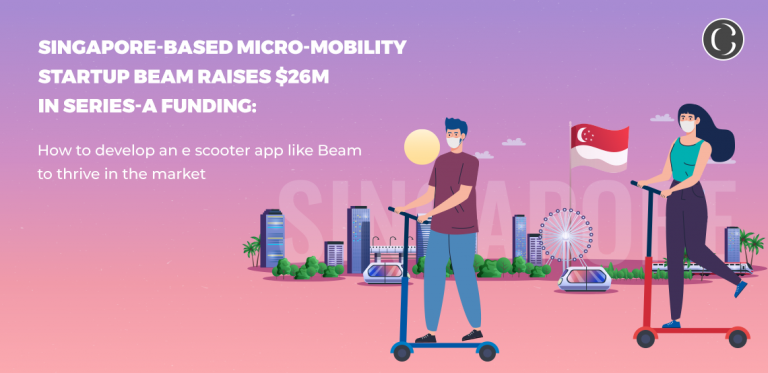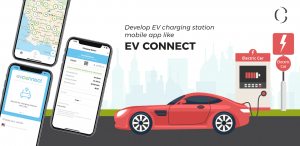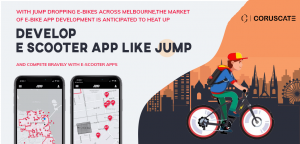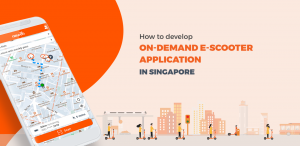Singapore-based micro-mobility startup Beam raises $26M in series-A funding: How to develop an e scooter app like Beam to thrive in the market

The Beam is a leading micro-mobility player of the Asia-Pacific region, headquartered in Singapore has raised USD 26M in a Series A funding round. The financing round was led by Sequoia Capital and Hana Ventures and other investors across APAC including AppWorks, RTP Global, Right Click Capital, RedBadge Pacific, and Cherubic Ventures. The startup has raised a total of USD 32.4M funding to date.
The Beam is the only e-scooter startup from the APAC region to come out officially Climate Neutral Certified. Climate Neutral is an independent non-profit organization and Beam worked with it to measure and offset its 2019 carbon emissions footprints. To do that, Beam has invested in projects like renewable energy, or large scale tree plantations.
Beam has secured funding at a time when other young startups across APAC are struggling hard to survive in the industry. Beam has implemented stringent cleaning and operations practices in light of the ongoing concerns about the covid-19 pandemic and to contain the possibility of virus transmission.
The Beam will use the fresh capital for expansion across all the growing mobility markets across the APAC region including Australia, Korea, Malaysia, New Zealand, and Taiwan.
The Beam is forging a new path for micro-mobility with docked e-scooters in contrast to the established dockless model. With its virtual docked model, Beam ensures that riders park the vehicles in predetermined parking, and it also offers incentives for that through the app.
The Beam will also accelerate the introduction process of its latest 3rd-gen e-scooter, the Beam Saturn, to all the above-stated markets. Beam Saturn is custom-built for sharing and rigorously tested with the highest safety standards. Its outstanding features include an innovative aviation-grade aluminum frame, swappable batteries, 25-centimeter tubeless safety tires, a dual (mechanical and electronic) braking system, and high grip rear-wheel drive.
The Beam will introduce its new initiative Beam Safe Academy initiative across the APAC region. It is nothing but a number of online training tools that further expanding to the real-world e-scooter rider training program.
Beam has deep insights into the evolving micro-mobility transportation landscape in all its markets. Beam has given an edge in the micro-mobility space across the APAC region due to the combination of many factors including innovative technology, collaboration with government, a razor focus on high safety standards for both riders and pedestrians, etc.
The current state of e-scooter rental in Singapore?
E-scooters/e-bikes services are gaining popularity amongst the commuters in Singapore. These devices are the ideal option for those who have reduced mobility, or those who need to move between several relatively nearby locations multiple times a day, or who simply appreciate having another transportation option.
In Singapore, e-bikes or Power Assisted Bicycles (PABs) are under a separate category than the lighter e-scooters which are categorized as Personal Mobility Devices (PMDs).
The use of e-scooters and other PMDs on public paths in Singapore is governed by the Active Mobility Act (AMA), while the use of e-bikes or other PABs is governed by the Land Transport Authority (LTA).
LTA has banned e-scooters on the footpath in Singapore, meaning e-scooters will be confined only to 440km of citywide cycling paths instead of the 5,500km of footpaths riders was previously allowed to use. The e-scooter ban has been extended to other motorized PMDs including unicycles and hoverboards in 2020.
The footpath ban is still a huge restriction on the use of e-scooters as a shared mobility device. The government has also passed a grant to help owners of e-scooters to switch to e-bikes, but the process will certainly take time, and commuters will have to find alternatives meanwhile. Although the LTA is planning to expand the network of cycling paths in the city to 750km by 2025.
PMD rules and regulations in Singapore:
Before you start your e-scooter rental business in Singapore, you should be aware of the PMD laws for riders as well as operators in Singapore. Below we have stated some important PMD rules:
- Before your e-scooter fleet gets on the road the model of the same should be approved by the LTA. Although businesses operating in Singapore are obliged under the AMA to only sell the LTA approved PMDs.
- To get the approval your PMD must meet the standard configurations such as: It should be the maximum width of 70 cm and a maximum weight of 20 kg.
- Under the AMA, PMDs must not be used on highways, footpaths, or pedestrian-only paths. But there are 2 exceptions to this rule: If you are crossing the pedestrian-only path or the shared path you were on is blocked and you compulsorily had to take the pedestrian-only path.

- Owners of the PABs will compulsory have to take a theory test before they are allowed to ride their devices in public.
- From 1 July 2020 onwards, all PMDs must comply with the UL2272 fire safety standard.
- Businesses that have workers using active mobility devices including both PABs and PMDs for work will be required to buy third-party liability insurance for the users.
- Riders must be at least 16 years old to use PMDs on cycling paths and that too with a maximum speed of 25 km/h. Those below age 16 can use only under adult supervision.
- Users of active mobility devices will not be allowed to use their mobile phones while riding unless the phones are used in a hands-free manner.
Do e-scooter rental services have a future in Singapore:
ASEAN cities in general are notorious for their traffic congestion. In addition to money and time wasted in traffic congestion, a considerable amount of time spent just looking for parking in the city. Fortunately, this severe problem of traffic congestion is boosting the appeal for alternative modes of transportation in ASEAN cities in general and Singapore in particular.

Tech companies in the region are exploring micro-mobility options such as shared e-bike/e-scooter services to improve urban mobility. Micro-mobility is a term coined by a famous tech analyst, Horace Dediu for emerging forms of transportation encompassing trips of less than 8 km. Dediu defined micro-mobility as the vehicles which are not cars and yet are motorized.
Sharing mobility to get somewhere fast is a real safety hazard for e-scooter users of South-East Asian countries. Majorly due to the unsupportive infrastructure and uneven roads that can impede movement for users.
Singapore has now started to develop more micro-mobility friendly Infrastructure and that attracted more and more startups to emerge or expound their business in the market. But, with present-day challenges, it is yet to be seen if the new sustainable e-scooters and its infrastructure can prove to be effective in Singapore.
Develop an e-scooter app like Beam with Coruscate
Coruscate is one of the leading e-scooter app development companies across the world. We have developed 10+ solutions worldwide for e-scooter startups. We can not only help you develop an e-scooter app, but we will assist you in choosing an affordable fleet of e-scooters that is compatible with the legal standards in Singapore. Our team of developers has expertise in integrating IoT technologies within an e-scooter app by using the MQTT protocol.
To know the e-scooter app features and pricing structure, contact our experts now.









